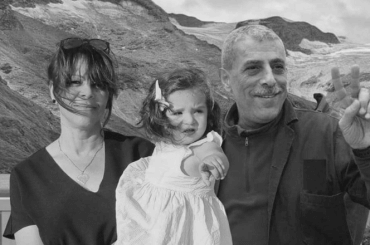Peter Maass is a journalist who has a long history of writing about war and he just published a piece in the Washington Post reflecting on the Gaza genocide from his perspective as a Jewish writer who has seen many war crimes.
In the piece, titled, “I’m Jewish, and I’ve covered wars. I know war crimes when I see them,” Maass writes, “Millions of Jews in America feel connected to Israel’s creation. Maybe our ancestors gave or raised money, maybe they went and fought, maybe they donated to Zionist organizations. What’s a Jew to do now? Everyone makes their own choices, but my experience of war crimes taught me that being Jewish means standing against any nation that commits war crimes. Any.”
Maass gives the impression of a fairly typical American, secular, Jew whose family was probably much more connected to Zionism than he ever was. But it’s clear that he feels pressure as a Jew to look away from Israel’s war crimes. His dedication to his craft and his conscience do not allow him to do so.
It is clear that October 7 has served as a turning point in the American Jewish community. We have seen significant numbers of Jews coming to activist organizations like Jewish Voice for Peace and IfNotNow, and others making statements like the film director Jonathan Glazer and the many Jewish artists and public figures who supported him. But others have gone in a different direction.
Consider, for example, the words of Peter Frey, the chairman of the board for the liberal pro-Israel group, J Street. “J Street is a Zionist organization,” Frey told the New York Times. “It’s ‘pro-Israel, pro-peace’ — it starts with ‘pro-Israel.’”
The narrowing space for liberal Zionism
The Times article paints a very bleak picture for liberal Zionist groups. Their own staff members and donors are said to be leaving them over their reluctance to criticize Israel’s actions in Gaza more forcefully.
It has long been a critique of J Street and similar organizations that, while they believe more in diplomacy and some limited compromises than groups such as AIPAC, they ultimately put Israel’s interests ahead of principles of peace, justice, and equality. Frey’s words would seem to support that view.
This isn’t just starting now, after six months of a genocidal assault. It’s a breach that began to open in the early days of Israel’s onslaught. Back in November, Israel’s crimes were already so great and so visible that its supporters went all in on a large rally in Washington, gathering people and speakers from all over the country.
The demonstration was unambiguously a pro-war rally. At the time it was held, on November 14, the casualty numbers in Gaza stood at just more than 11,000, the rally was filled with exterminationist messages about Gaza. When the liberal CNN commentator Van Jones spoke, saying, “I pray for peace — no more rockets from Gaza and no more bombs falling down on the people of Gaza. God, protect the children,” he was booed off the stage, with the boos soon dissolving into chants of “no ceasefire.”
J Street was one of several “pro-Israel, pro-peace” groups that were part of that rally. After it was over and the whole world saw the murderous atmosphere that emerged from it, they complained about the last-minute of notorious pro-Israel Jew-hater John Hagee of Christians United for Israel (CUFI).
But the nature of this rally was clear long before Hagee was added to the list of speakers. If you want to go to a hate rally as a “peace bloc,” as these groups professed, you go to protest the rally, or at least as a separate bloc standing apart from it. Not as part of it. Whether or not they intended to do so, they supported the message of hate from that rally.
J Street’s president Jeremy Ben-Ami told the Times that they were picking up some people who once thought J Street was too critical of Israel. This is presented as a way to balance the increasing disillusionment with such groups by American Jews, especially younger ones. In reality, it simply shows the new role groups like J Street, Americans for Peace Now, T’ruah, and others will be playing in the future, one that is gradually drifting away from progressivism.
As the larger Jewish organizations move ever rightward, formerly liberal pro-Israel groups are taking up the center-right position. That position is characterized by prioritizing Israel’s Jewish ethnocracy, and its military hegemony while also insisting on an ephemeral and non-viable two-state solution and urging “diplomacy over violence.”
To be clear, this is not done in as cynical a way as that might sound. The groups sincerely believe that this is a path to co-existence. But it’s important to remember that none of these groups support Palestinians’ right to defend themselves even in the two-state scenario. Their passionate insistence on a “demilitarized” Palestinian state would leave the Palestinians at Israel’s mercy forever. The limit they envision is on Palestinian sovereignty, a key condition of which is the right and ability to defend your territory and citizens, a right Israel trumpets for itself every day.
But this limited sovereignty is their vision of Palestinian independence, which they contrast with AIPAC, the American Jewish Committee, CUFI, and others who envision no independence for Palestinians at all.
The ethnocratic divide
In terms of the U.S. Jewish community, it looks like the differences and divisions are going to sharpen in a stark manner. It cannot be otherwise; most of us in the movement for Palestinian rights are insisting on the term “genocide” for what is happening, and that is not a term that people can simply agree to disagree about.
On the pro-Israel side, the warping of the fight against antisemitism has taken such a strong hold that any mention of Palestinian rights is construed as Judeophobic. Combined with their defensive reaction to being accused of supporting not just apartheid but genocide, groups like AIPAC, the ADL, AJC, and others use October 7 in a most racist manner, portraying it as “proof” that Palestinians, as lesser beings who cannot be trusted with the same freedoms as Israeli Jews.
Those individuals who, as Ben-Ami put it, want to try to establish their “50-yard line” middle ground between those supremacists and those Jewish groups standing in solidarity with Palestinians, are already drifting into one camp or the other, leaving little ground for groups like J Street trying to stay in that middle ground.
The arguments between what we might call the AIPAC camp and the JVP camp are still going to be about whether Israel is an apartheid state (it is), a settler-colonial project (it is), and whether it has committed genocide (it is doing so now).
But despite Israel’s genocidal efforts, as the executive vice president of the Center for International Policy, Matt Duss, put it, “Neither Israelis nor Palestinians are going anywhere and if your proposed solution is for one of those two to leave, you’re part of the problem.”
He’s right. For Americans, and especially American Jews, that leads us to ask what kind of future we want to support for all the people living between the river and the sea. It’s no longer about one state, two states, or similar structures, despite the efforts of so many in Washington to impose their own structures, whether they are sensible or not.
It will be about whether Palestinians will have equal rights in every way—including the right of return and the right to ensure their own security, just like Israelis. And that means the question for American Jews will ultimately come down to whether we want to continue to insist on an ethnocratic formulation featuring a Jewish state, or whether we will help Israel to abandon the fiction that it can be an ethnocratic and democratic state at the same time. It cannot. It will have to choose.
On the path of continued ethnocracy, there is continued violence, continued apartheid, spreading colonialism, and more instances of genocide or attempts at genocide. 76 years of Israel’s existence and Palestinian dispossession have proven that conclusively.
The path of democracy also has many pitfalls. A democratic path can be pursued in many different state structures, including multiple or confederated ones, or one democratic state, which would be the simplest and probably stand the best chance of success, but any formulation will face significant challenges. But that option holds at least the opportunity for a better future for all concerned, one that strives toward real justice and, therefore, real peace and real security.
That would be the future that beckons to Peter Maass as he struggles to reconcile his Jewish identity with the war crimes he is seeing. It’s the one he senses when he writes, “The idea of Jews protecting the rights of Palestinians is not as new as you might think. Before the Holocaust, my ancestors were part of the “non-Zionist” movement that supported Jewish emigration to Palestine but opposed the creation of a Jewish state.”
The Israelis are there, and the Palestinians never left. No one is going anywhere, If the last six months prove anything at all it is that democracy, justice, and universalism are the only way out of the horrors wrought by this Zionist ethnocracy, apartheid, and colonialism.



“On the path of continued ethnocracy, there is continued violence, continued apartheid, spreading colonialism, and more instances of genocide or attempts at genocide. 76 years of Israel’s existence and Palestinian dispossession have proven that conclusively.”
Re Israel’s future, today the New Yorker published a piece titled “Is This Israel’s Forever War?”. ( delete New Yorker cookies for access):
“If you ask me what I am puzzled by, it’s not the barbarity of either Hamas or the Israeli government,” Ian Lustick, a political scientist and longtime student of Israeli affairs, told me in late March. “It’s why Biden is so slow on the uptake here.”….Israeli Prime Ministers, he said, almost never ended wars because they wanted to; instead, they did so when their allies, and in particular the United States, forced them to. This had happened in 1982, when Ronald Reagan called Menachem Begin to stop attacks on Lebanon; it happened in 2002, when George W. Bush leaned on Ariel Sharon to end his incursion into the West Bank. “Not a single war has ended because Israel’s war aims were achieved,” Lustick told me. “They always end when the United States says, ‘O.K., now you gotta stop,’—and they do. We say that in different ways, but we always have to say it, and it’s partly because the Israeli government needs it to be said, because otherwise they’d have to admit that they didn’t achieve their war aims.”….Hall was worried about the so-called “day after.” “So you wipe out every Hamas soldier—then what?” she asked. “You just created a whole bunch of orphans and people who are forever traumatized by this without really anything on the other side of it.” Israel would not be able to simply leave the Strip, as it has after previous episodes of what it called “mowing the grass.” “This is very different,” Hall continued. “And I fear that if there isn’t a bigger reconstruction plan on the other end, this will be a festering wound, even more so than it has been, for decades to come.”
https://www.newyorker.com/news/the-weekend-essay/is-this-israels-forever-war
“The idea of Jews protecting the rights of Palestinians is not as new as you might think. Before the Holocaust, my ancestors were part of the “non-Zionist” movement that supported Jewish emigration to Palestine but opposed the creation of a Jewish state.”
Chomsky recently talked about “the non-Zionist” movement that supported Jewish emigration to Palestine but opposed the creation of a Jewish state” here.
https://www.youtube.com/watch?v=zKQOrAyXM5U
One of Noam Chomsky’s latest statements.
“It is not a war, it is murder”
https://asre-nou.net/php/news/Chomsky-Statement.pdf
I thought this was a good article until I began asking myself “what is Plitnick’s solution, then?” I think his closing argument is poorly presented. Plitnick sets up the two state solution as a “straw man,” knocks it down, and then casually throws out a one state solution as the best option by default. He never goes on to propose how the “significant challenges” of doing so would be met,and with good reason. It’s beyond wishful thinking to suggest that two parties in conflict for years will suddenly (or even eventually) coexist under one flag. Does Plitnick really not think that there would be endless conflicts over every aspect of life?
A 2-state solution would allow two parties with different beliefs, religions and custom to plot out a future that best suits them individually. That seems a lot more realistic to me. And much more democratic. Would a 2 state solution resolve every past injustice? No. But neither would a 1 state solution.
I disagree with Mitchell that Israelis are not going anywhere. I agree that Jews who were born in Palestine have every right to stay and that has been the Palestinian position consistently. One democratic state was in the PO charter until Bush the father forced them to change it. But we must remember that European Jews had no option but to immigrate to Palestine after World War II and Oriental Jews often were victims of machinations of Zionists who wanted them to immigrate and populate Israel despite the fast that they had lived in MENA for millennia peacefully and prosperously for the most part. Israel has used Law of Return and every economic incentive to get people to immigrate (more correctly to “invade”) to swell its population. At any time between 1 to 2 million Israelis are outside of Israel. I don’t blame them since Israel is a highly militaristic country. So, I suggest that in one democratic state Jews who want to immigrate to Europe or USA, go back to Russia or claim their ancestral lands in Iraq, Iran, Morocco or elsewhere be given the citizenship of those countries and a chance to return. It is within their rights..
The “two-state solution” – I put it in quotes because Israel has eaten up much of the land that was supposed to be Palestine – presumes that people of different ethnocracies cannot live together. That is the supposition that Israel was founded upon. But it isn’t true.